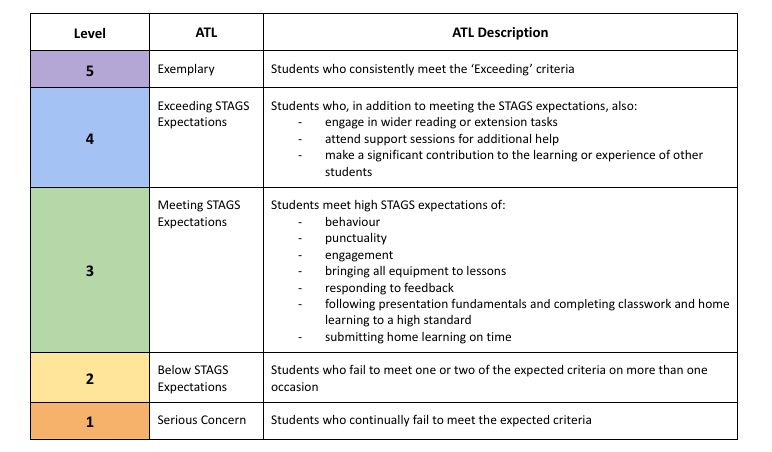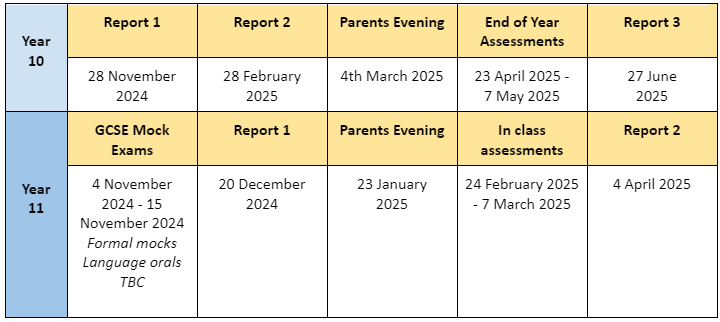Key Stage 4 Information (Years 10, 11)
Curriculum
As outlined in depth on the curriculum page and in our currciulum plan linked below, we have built a curriculum that allows our students in Key Stage Four to continue to build on their love for learning as well as on their foundational knowledge and skills so that they are able to reach their potential. During Year 9, students exercise their choice over elements of their Key Stage Four curriculum which is developed around a broad offer of GCSE courses.
The core GCSE Curriculum consists of English Language and English Literature, Mathematics, and Science. All students study Combined Science with some studying Biology, Chemistry and Physics as separate Science subjects.
To maintain breadth and balance in the curriculum and to enable students to develop their individual
strengths, everyone is expected to study a range of subjects. Most study History or Geography and a Modern Foreign Language (French and/or Spanish) to enable students the opportunity to achieve the English Baccalaureate. In addition, our flexible options programme encourages students to follow courses from a wide range of different curriculum areas including Art, Business, Child Development, Computing, Dance, Drama, Food Preparation & Nutrition (Food Tech), Computing, Media Studies, Music, PE, Philosophy and Ethics (REP), Design Technology (Product Design &Timbers) and Sociology.
At Key Stage 4, students are taught Personal, Social and Health Education (PSHE). This continues from the course followed at Key Stage 3 and includes Relationship and Sex Education and Careers Education, Information Advice and Guidance. All students follow a Physical Education programme and PSHE which includes Careers, Employability and Finance Education and fulfils the National Curriculum requirements for Citizenship education. Religion, Ethics and Philosophy (REP) is compulsory for all students and follows the Hertfordshire approved SACRE curriculum, developing Philosophy and Ethics.
Assessment and Reporting of Progress
In Year 10, students will receive a report card each term (three per annum). Every report card will contain the Most Likely Outcome (MLO) grade and Attitude To Learning (ATL) for each subject at GCSE. In addition to this, the Target Grade for each subject will also be given, which is generated with guidance from the Fischer Family Trust (FFT). This organisation helps us to set aspirational targets for students based on their prior attainment at KS2 where that data is available, or from CATS tests carried out in Year 7. For students who have recently joined the school and for whom KS2 data is unavailable, we will generate an appropriate aspirational target grade. In the summer term, the third report card will also include an end of year exam result.
In Year 11, students receive two report cards. One in the Autumn Term after their mocks and another in the Spring Term. Similarly to Year 10, the report card will contain an MLO, ATL and their Target Grade. In the Autumn term, students will also receive their mock exam result. As in Year 10, your child will be awarded an Attitude to Learning level as outlined below. Students will also receive a Praise and a Progress comment from each subject teacher, as well as a Director of Learning overall comment and a form tutor comment once a year.
Attitude to Learning Levels
We have high expectations of all students at STAGS, and we expect most students will receive a Level 3 for ‘Meeting STAGS Expectations’. Over the course of the year, some students may demonstrate that they have exceeded these expectations and will be awarded a Level 4. For exemplary attitude, students will receive a level 5 and will be invited to a Headteacher’s celebration lunch where they can share how they have exceeded expectations in a subject area:

KS4 Reporting - Key Dates for 2024-2025

Assessment and Feedback at STAGS
Each curriculum area determines the nature of the subject assessments based on the Examination Specification requirements and progress through the Learning Journeys. Details of the full GCSE course for each subject are available on our school website. Each student can expect the following:
-
Subject specific feedback
-
Student response to marking using Purple Progress Pens
-
Regular record of learning checks - to maintain high expectations and to provide feedback on the presentation fundamentals
-
A variety of additional forms of feedback are deployed during all learning, whether at school or at home and includes, but is not limited to: peer, self, live, verbal, digital and whole class feedback
If you have any queries about your child’s progress within a subject, please do not hesitate to contact their subject teacher in the first instance.